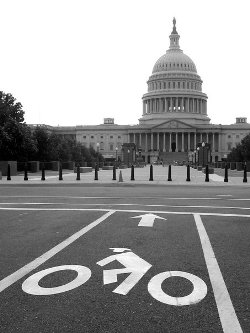
The outcome of New York's Congressional races on Tuesday may end up determining federal transportation policy for years to come.
The state has a number of very close House races, from the tip of Long Island to the Canadian border, and those could be the difference between a Democratic or a Republican majority. The unparalleled importance of transit to New York state also means that its delegation shoulders a critical responsibility to advance progressive federal transportation policy. The transportation reauthorization bill will be dramatically affected by who's representing New York in Congress next year and what they choose to fight for.
That's why the survey of House candidates by the New York State Transportation Equity Alliance is so valuable. NYSTEA just released the survey results, putting candidates on the record with their positions on transportation policy.
To read about the candidates' top priorities for the transportation bill, check out Mobilizing the Region, which has compiled all of them. Here are a few answers that leaped out at us:
- Tim Bishop, who represents the eastern end of Long Island and is locked in one of the closest races in the state, showed he was willing to support sustainable transportation in no uncertain terms, without pandering towards drivers. "One of my top priorities for the Surface Transportation Authorization Act is to decrease the nation’s reliance on automobile travel and increase funding for transit improvements and operations," he wrote. Bishop also said he was working on supporting smart growth policies in Congress.
- Louise Slaughter, the powerful Rules Committee chair from Rochester, gave some impressively detailed answers. In addition to pledging her support for transportation choices that boost public health, the environment, and mobility for all, she got into the weeds more than most respondents. "I especially support the creation the Office of Livability within the Federal Highway Administration (FHWA) of DOT, which would establish a focal point within FHWA to advance environmentally sustainable modes of transportation, including transit, walking, and bicycling," wrote Slaughter. She also argued for a transportation funding structure based on national performance objectives, a shift away from the current formulas that give money to states indiscriminately.
- And Brooklyn representative Yvette Clarke made sure to look at the transportation bill from multiple perspectives. She put forward three priorities: "1. Create jobs, especially green jobs 2. Focus on public transportation as much as highway expansion 3. Greater transparency and public participation in the transportation planning of communities."
The rest of the answers, which you can see here, also revealed some interesting facts about New York transportation politics. For example, the 12 Democrats who replied all supported shifting federal transportation spending, which is currently divided 80-20 between highways and transit, toward public transportation. The two Republicans who answered (Michel Faulkner and Diana Muñiz, running long-shot campaigns against Charlie Rangel and Ed Towns, respectively) said they wouldn't support such a shift.
And while all the Democrats supported increased transit funding, that didn't mean they were all ready to stop pumping money into more auto infrastructure. Staten Island Congressman Michael McMahon, a vulnerable freshman, argued against prioritizing road repairs over new capacity. "Our States and localities should have the ability to use highway funds to maintain existing infrastructure and build new roadways or expand existing ones," he wrote.
The transportation reauthorization isn't the only way that Congress pushes for sustainable transportation. Albany representative Paul Tonko noted that he's a co-sponsor of the Livable Communities Act, which would help fund local smart growth efforts, while Hudson Valley rep Nita Lowey, who sits on the Appropriations Committee, touted the money she's been able to funnel toward sustainable planning, transit-oriented development, and walkable communities.
Several of the most powerful members of the delegation, however, didn't fill out the NYSTEA survey, staying silent on transportation policy instead. Senior representatives of some of the most transit-dependent constituents in the country, including Jose Serrano, Ed Towns, Charlie Rangel, Nydia Velázquez, and Carolyn Maloney, were among the no-shows. Hopefully they'll be speaking up in the halls of Congress even if they didn't in this survey.





